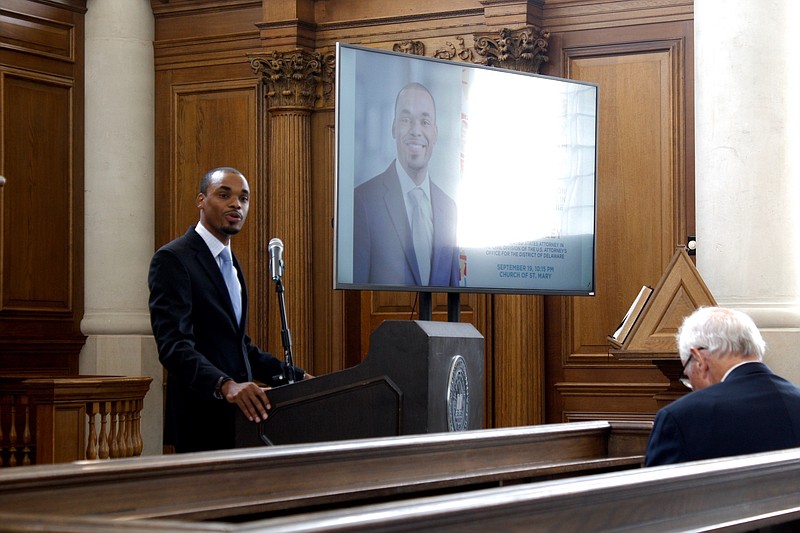Law and religion were the focal points of a lecture given by Derick Dailey on Thursday morning at the 14th Hancock Symposium.
The assistant attorney of the U.S. Attorney's Office for the District of Delaware addressed the nave at the Church of St. Mary, the Virgin, Aldermanbury. Dailey was a 2011 graduate of Westminster College where he earned degrees in political science and religious studies, two of his passions.
"(I was inspired to give this lecture) to try and make sense of lived experience and trying to make sense of theology and law, the two things that have shaped me," Dailey said.
After earning his bachelor's degree at Westminster, Dailey attended Yale's divinity school and earned his juris doctor at Fordham University School of Law. During his lecture, Dailey emphasized multiple times his lecture reflects only his own views and not the views of the U.S. Attorney's Office for the District of Delaware.
Dailey spoke about instances where his faith has come into play in his mind when looking at difficult legal situations. One example he shared was when his home state of Arkansas planned to execute eight inmates in 11 days in April 2017.
"(The inmate Ledell Lee's final request before execution) was to receive communion as his last meal," he said. "Strikingly, Ledell's communion was on a Thursday and his death on a Friday - eerily similar to another state sanctioned execution alleged to have taken place some 2,000 years ago."
Dailey, compelled by this, followed and studied the story during his final year to law school. This inspired him to begin exploring things with a "theo-legal imagination," which entails doing the "right thing, in the right way, for the right reasons."
"(While studying this case), I had to ask myself, 'What is God doing in this moment?'" he asked.
Dailey wanted this lecture, which he gave for the first time Thursday, to articulate the ongoing dialogue between God and justice. However, he said he soon realized his lecture would only be able to encapsulate "our ways, but not God's ways."
"Law is developed in context, and theology comes out of context and lived experience," Dailey said. "For that reason, the law is always changing. You get new legislature, new laws; you a new president, a new vision."
He explained through his legal studies and career, he had begun questioning his own faith and had questioned why God would allow such injustice and devastation in the world.
One example he cited was a quote by Dawn Usanga, mother of slain 7-year-old Xavier Usanga, in the St. Louis Post-Dispatch:
"In a way, I'm kind of happy he died at 7. These streets didn't have a chance to ruin him. He could have just as easily been swept up in this war, and the boy who shot him could have been my boy someday," Usanga said.
Dailey said: "There is perhaps nothing more hopeless than hearing a mother of a dead child say 'I'm kind of happy he died. Hopelessness is pervasive in this country, in part because people have normalized injustice and anguish."
He said he has come to the conclusion theology is not about text within the Bible. But rather, it is concerned with practices and lifestyles, and the law of the country cannot remedy injustices simply on its own.
"The law needs help, and I argue that the theological reflection is that there is only one source," Dailey concluded.

